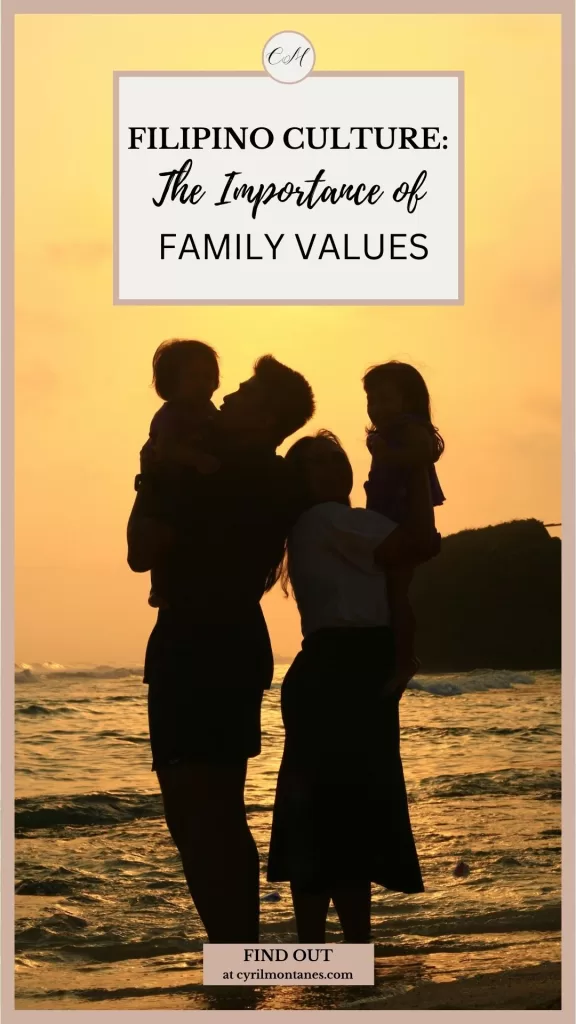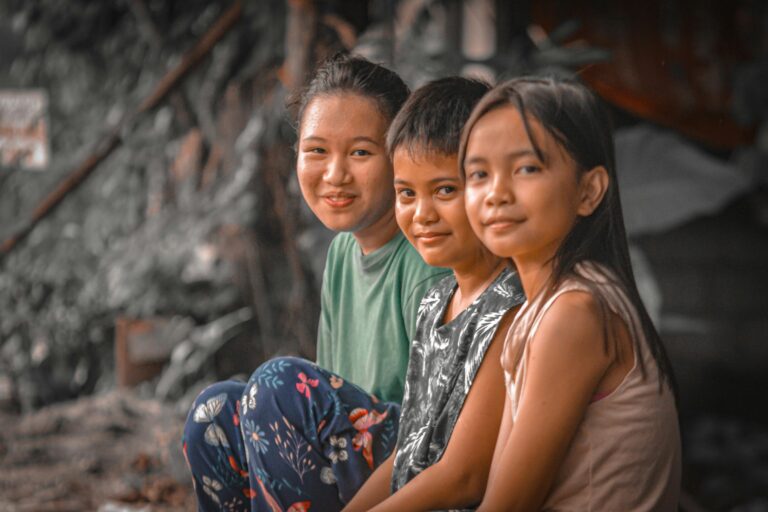Filipino Culture: The Importance of Filipino Family Values

Wherever you go, you will always find Filipinos —no exaggeration! Just consider the numbers: in 1980, approximately 501,000 Filipino immigrants made the U.S. their home, and by 2021, that figure had surged to nearly two million, and that number continues to climb. Many friends from the Philippines, including us, have since relocated to various countries. Our church from the Philippines is establishing satellite churches worldwide, primarily serving Filipinos. It’s incredible to find Filipinos around the globe.
Filipino culture is distinctive; we carry cherished values handed down through generations, no matter where life takes us. Filipino family values are at the heart of our identity, shaping how we connect. You’ll feel the warmth and joy of our gatherings whenever you meet Filipinos. No celebration is complete without the delicious smell of our signature dishes, and the sound of karaoke singing considered the National Hobby of Filipinos. Whether it’s a birthday party, a wedding, or a casual Sunday meal, the atmosphere is filled with Filipino hospitality, creating a welcoming environment. Picture a birthday celebration where the entire family, from grandparents to young children, comes together to celebrate or a wedding where the community helps to prepare a grand feast. These moments of togetherness foster a sense of belonging within our vibrant community.
Let’s embark on this exciting journey together to explore how these family values enrich our daily lives, shape our identities, and weave the fabric of our communities. Join me as we delve into the vibrant family culture thriving in Filipino society and celebrate the beauty of our shared experiences!
Dive into the Filipino language by exploring these blog posts, and start learning Tagalog words today!
The Role of Family in Filipino Culture
In Philippine culture, family is everything. It’s the foundation of our lives, shaping our beliefs and values in many ways. The support and advice from our loved ones are crucial in shaping our decisions and aspirations. We look up to our elders, often turning to them for guidance and wisdom. Many even put their aspirations on hold to support their families as breadwinners. Caring for our parents is commonly expected when they can no longer care for themselves. This deep respect for family strengthens our bonds and creates a strong sense of community, making it a vital part of what it means to be Filipino.
“Utang na Loob” – The Debt of Gratitude
At the heart of this value is the principle of gratitude. Our parents teach us the importance of appreciating every relative or friend who has played a role in our success or helped us in tough times. In return, we show our gratitude through acts of kindness or holding these people in high esteem. This idea, known as ‘utang na loob,’ goes beyond just exchanging favors; it represents a lifelong commitment to acknowledging and repaying the kindness we’ve received. This sense of duty and commitment to our loved ones strengthens our community and bonds.
This deeply rooted sense of obligation is a big part of Filipino life, where relationships often stretch beyond family to include friends and community members. These connections help strengthen the ‘Bayanihan’ spirit—a term from ‘Bayani,’ meaning hero. Bayanihan is all about coming together as a community, uniting to achieve a common goal, whether moving a house or supporting a needy family. This spirit ensures that everyone has the support they need during difficult times. By practicing kindness and helping one another, we create a cycle of mutual help that deepens our community bonds and enriches our cultural heritage, reminding us of the importance of interconnectedness in our social lives.
Learn more about Filipino culture in this article: Exploring Filipino Culture: Things You Should Know
Respect for Elders

In the Filipino culture, respecting elders is at the heart of our family values. One beautiful way we show this respect is through the gesture of “mano po,” where we take an elder’s hand and press it gently to our forehead, seeking their blessing. While you might see this tradition more in rural areas, elders are still expected to be greeted with respectful terms like “po” and “opo.” For instance, we say, “Magandang umaga po, lolo!” which means “Good morning, grandpa!” And when someone asks, “Kumain ka na ba ng almusal?” (Have you eaten breakfast?), we reply, “Opo, kumain na po ako.”
This respect isn’t just for family; it extends to everyone we meet. We avoid using first names and instead choose respectful titles like Kuya (older brother), Ate (older sister), Tita (aunt), and Tito (uncle). Honoring our elders means appreciating their experiences and wisdom, significantly impacting our families and communities. By upholding these traditions, we strengthen our bonds and pass these family values on to future generations, keeping our culture vibrant and alive.

Strong Family Ties
Filipino families are known for their tight bonds, rooted in the concept of ‘kapwa,’ which reflects a shared identity and connection among family members. ‘Kapwa’ reminds us that our choices affect not just ourselves but our entire family. It’s hard to imagine cutting ties with family after marriage; we look forward to family gatherings and events. These occasions are about so much more than just the celebrations—they’re about the shared experiences, laughter, and support we offer one another. This commitment to family life creates a nurturing environment where we can lean on each other during joyful times and challenges. Our connections reinforce the idea that family is not just a part of life; it’s the heart of who we are, fostering a sense of belonging and shared identity.
Filipino families often function as a united front, sharing resources and supporting one another. This unity shines through, especially during tough times when we provide emotional, financial, and practical help. This profound sense of belonging and care ensures no family member feels alone.
Evolving Filipino Family Values in the Modern World
With the rise of technology and the journey of many Overseas Filipino Workers, we’re finding new ways to reconnect with our roots. I remember my childhood when reaching out to relatives abroad meant sending recorded messages or letters in the mail. Overseas phone calls were an option back then, but they often came with a hefty price tag. Things changed when emails became popular, and now, thanks to social media, we can keep those family ties strong through video calls.
But despite all the ways we can communicate, the challenge of holding onto our family values in a different culture is real. The influence of individualism, the hustle of modern life, and being far from home can sometimes test our commitment to those cherished values.
No matter how we connect, Filipinos treasure these moments, knowing that the love and warmth of family can bridge any distance. This bond, strengthened by technology, turns our interactions into celebrations filled with stories, laughter, and support. Whether it’s a video call that crosses miles or a simple message decorated with heartfelt emojis, our dedication to family is unshakeable and alive, reminding us that we are always together at heart, no matter where life takes us.

A Celebration of Love and Resilience
To truly understand the importance of these family values, let’s look at the lives of Overseas Filipino Workers (OFWs) and highlight their significance. Many OFWs work hard and prioritize sending money back home to support their families in the Philippines, especially their parents. This dedication shows their commitment to honoring their roots and expressing “utang na loob” (debt of gratitude) by sharing a portion of their earnings to meet their parents’ needs and help their siblings with their education.
In addition to financial support, many send “Balikbayan” boxes filled with goodies and essentials. These boxes aren’t just gifts; they symbolize generosity and a strong connection that crosses borders. Every thoughtful package carries the essence of home, bringing back cherished memories and deep ties that transform every reunion into a heartfelt celebration of resilience and love.
Multigenerational households are typical, where grandparents often live with their married children and their families. This close-knit setup fosters a warm atmosphere (as long as there are no in-law squabbles! ☺) filled with shared experiences, laughter, and invaluable lessons from one generation to the next. It’s a nurturing space where grandparents can share their wisdom and stories, strengthening family bonds. The delightful scents of traditional meals waft through the air as families gather to enjoy food, love, and support.
These stories show how traditional Filipino family values can transcend geographical boundaries and adapt to modern life, reaffirming that the core of Filipino family values remains strong and vibrant.
Practical Tips for Instilling Filipino Family Values
For those looking to instill and preserve Filipino family values, especially Filipino immigrants raising their children in a different culture, here are some practical tips for encouragement and connection:
1. Celebrate Family Traditions:
Let’s celebrate the rich tapestry of Filipino holidays and customs, like Christmas, New Year, and other family traditions you practice back home! These special occasions are excellent opportunities to deepen family connections and honor our cultural heritage. After nearly a decade in the United States, we’re passionate about keeping the Christmas spirit alive for our son. We cherish the “Noche Buena” tradition on Christmas Eve, gathering around a festive dinner filled with love and laughter, and we can’t wait to open gifts at midnight on December 24th!
2. Teach Respect for Elders:
Let’s inspire our young family members to honor their elders with simple yet meaningful gestures, like “mano po,” by inviting them into our family discussions. With our son, we cherish the importance of courtesy, teaching him to warmly greet his grandparents with “Good morning,” “Good evening,” or “Good night!” whenever they visit us in Texas or when we journey to Michigan to see them. During our video calls with family, we make it a point to remind him to extend those greetings as well. We also instill in him the beautiful habit of expressing gratitude with a heartfelt “thank you.” These little moments weave the fabric of our shared cultural heritage, and family values, creating bonds that last a lifetime.
3. Promote Reciprocity:
Fostering a sense of gratitude and reciprocity is essential for our little ones, especially when instilling the value of ‘utang na loob.’ Let’s encourage our children to recognize and cherish the kindness that flows within our families. This lesson truly resonates when they see us embodying these values with our loved ones, friends, and acquaintances.
Whenever we receive a thoughtful gift, a helping hand, or a kind favor, let’s share those beautiful moments with our kids. By doing so, we cultivate in them a heart full of thankfulness and respect for those who sprinkle their kindness into our lives.
4. Stay Connected:
Embrace the magic of technology to bridge the gaps of distance and strengthen your connections with loved ones! Regular video calls can create that warm, face-to-face feeling that makes conversations feel truly special and heartfelt. Group chats are an excellent way for families to share those precious moments in real time, whether it’s a quick update or a hilarious family meme that gets everyone laughing. And let’s remember the joy of social media, which keeps everyone in the loop about important events and daily life.
These tools are incredibly precious for families navigating migration. They help preserve strong family ties even when miles apart. They foster a deep sense of belonging and connection that transcends distance, allowing the warmth of family bonds to flourish no matter where you are.
5. Share Stories and Experiences:
Let’s create memorable moments for our family by sharing personal stories and experiences! Hosting regular family gatherings, complete with signature recipes from our elders, is a beautiful way to connect. As we prepare these beloved recipes, it’s the perfect opportunity to share the rich stories behind them—how they’ve been cherished and perfected through generations.
My husband and I love to reminisce about our childhood, reflecting on the games we played before the internet and gadgets took over. Since we don’t have family nearby in Texas, our son misses the joys of playing with cousins and experiencing family reunions. But by sharing our treasured memories, we give him a sense of pride and identity, weaving him into our vibrant family tapestry, even from a distance.
This practice doesn’t just preserve our family history for future generations and our family history for future generations; it also reinforces the invaluable family values and lessons passed down to us.
6. Encourage Collective Decision-Making:
Let’s embrace the spirit of ‘kapwa’ by involving the entire family in crucial decisions, especially when they are ready and mature enough to contribute. This excellent approach ensures that everyone’s voice is heard and strengthens our unity regarding their dreams. Children now actively choose their career paths, leaving behind the days of exclusive decision-making for the parents, even if it’s about their aspirations.
Even if our little ones are too young for major decisions, we can engage them in the fun of planning our next family vacation. Imagine letting them select exciting activities or places they’re eager to explore—a delightful way to spark their sense of ownership and responsibility!
These moments foster meaningful conversations where family members can share their hopes and aspirations. As we gather around the table, exchanging ideas and preferences, we create a warm atmosphere where every opinion is valued. Together, we build lasting memories that strengthen our bonds. Adopting this approach cultivates a family culture rich in love and collaboration.
Conclusion
In our rapidly changing world, the cherished family values of utang na loob, respect for elders, and strong family ties are essential pillars of Filipino culture. By embracing and nurturing these values, families can wonderfully preserve their cultural identity and deepen their connections, regardless of distance or generational gaps. It’s essential to recognize that while these values are significant, they are not superior to those of other cultures.
We hope this exploration of Filipino family values resonates with you and inspires reflection on your family’s unique traditions and practices. We would love to hear your thoughts and experiences—let’s come together to celebrate and cherish the rich cultural heritage of the Filipino family alongside the diverse values found in families around the world!
Thank you for joining us on this exciting cultural journey. If you have any stories or tips, please comment below or connect with us on social media. Let’s keep the conversation alive and continue celebrating Filipino family values and beauty together!
If you want to know more about me and my blog, visit my About Page. I share insights into our family life, the values we cherish, and my passion for showcasing the beauty of the Philippines alongside homeschooling, faith, and creativity. Let’s connect, share resources, and inspire each other on this excellent path!

